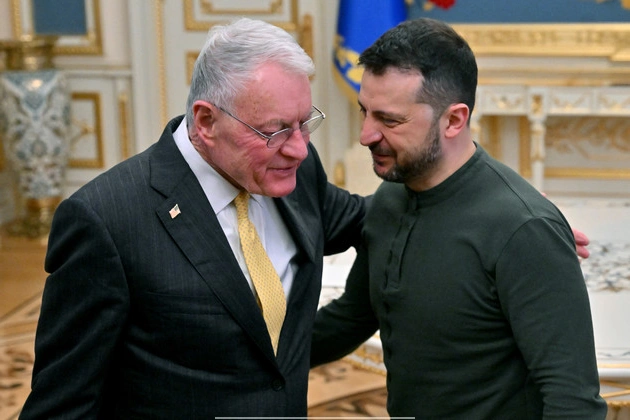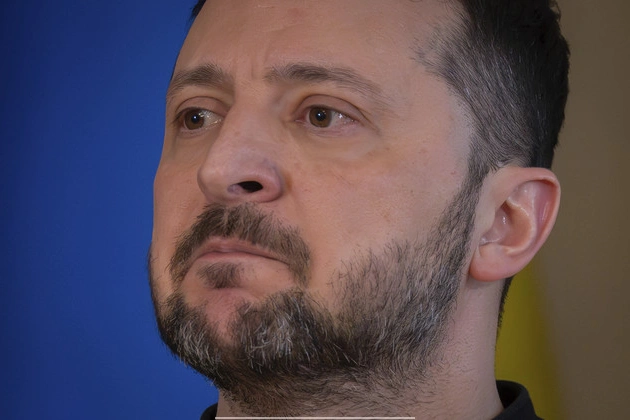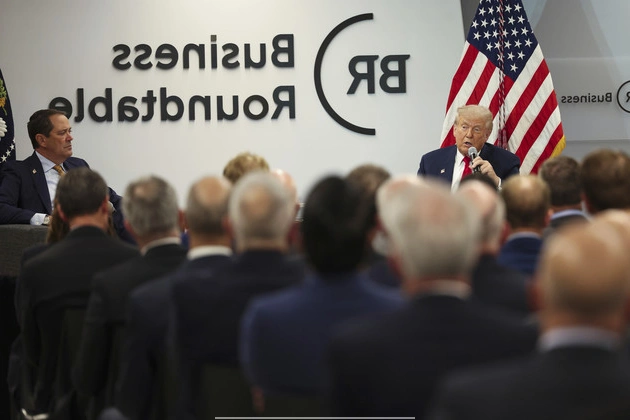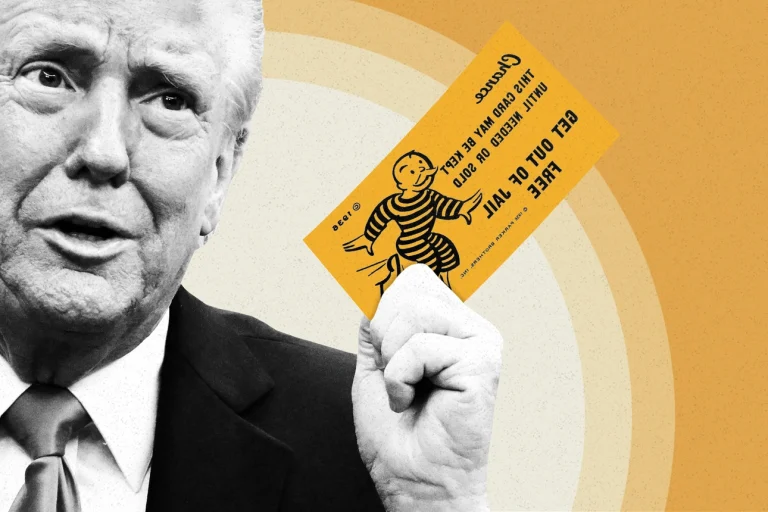
Top allies of President Donald Trump are in an escalating clash with the Republican Party’s once-powerful defense hawks, viewing them as key obstacles standing in the way of a thorough remaking of U.S. foreign policy that would realign the world order with Trump’s America First vision.
MAGA’s Push for Change
Vice President JD Vance and several administration officials who are close to Donald Trump Jr. have been central to the effort to sideline those with traditional conservative foreign policy views, which has accelerated over the past week.
Their targets have included a well-known Trump ally, Sen. Tom Cotton (R-Ark.), who has raised concerns about the nominee for a top Defense Department post, and the administration’s own special envoy on the Russia-Ukraine war, former Gen. Keith Kellogg, who is being undermined in Washington as he meets this week with top Ukrainian officials in Kyiv.
Given their past lives as Russia hawks, Trump’s own secretary of State, Marco Rubio, and national security adviser, Michael Waltz, are under intense internal scrutiny inside a White House where deputy chief of staff Stephen Miller and Sergio Gor, who oversees personnel decisions, have shown little tolerance for anyone who diverges from the MAGA mindset.
Underpinning all of it is Trump’s foreign policy mindset that elevates his personal relationships with leaders of rival superpowers, and the use of American threats to push allies and adversaries to buckle to American power, over the traditional alliances based on long-term cooperation and democratic governance. That has emboldened Vance and others to send a clear message to the world that Republican foreign policy as they have known it is dead — and they’re not sorry about it.
The Divide in Europe
The divide was on display in Europe over the past week. When Defense Secretary Pete Hegseth openly suggested to allies in Brussels that Ukraine should be excluded from NATO — in effect acceding to a key Russian demand — it shocked GOP hawks but delighted Trump, whose White House had sanctioned the comments. And when The Wall Street Journal cast Vance as playing hardball with Russia following an interview in Munich, the White House and vice president’s office called a meeting and decided to push back hard — with Vance himself accusing the paper of having “twisted my words.”
Trump’s go-it-alone approach has already been put on display in multiple foreign policy decisions, including his sidestepping of a congressionally mandated ban of the Chinese-owned TikTok app and his out-of-nowhere plan to “take over” and redevelop Gaza.
But the past week represents an escalation of the effort to cement a new chapter in U.S. foreign policy as Trump moves quickly to make good on his promise of quickly ending the war in Ukraine and to normalize relations with Russian President Vladimir Putin, a dictator whose strength he has long admired.
The Pushback from Hawks
The hawks are generally aligned with a larger bipartisan foreign policy establishment that worries Trump will reward Putin’s aggression with favorable terms in Ukraine and will thus project American weakness on the world stage, a view the president and his allies reject as old thinking.
“They should just let the president — who is in charge of the United States’ foreign policy — conduct foreign policy,” said one White House official, who like others interviewed for this story was granted anonymity to candidly describe the internal conversations. “He campaigned on this stuff, and the American people roundly gave him their support.”
Some of the hawks whose wings are being clipped are inside the Trump administration — including Kellogg, a decorated former three-star Army general whom Trump named as his chief envoy to settle the war that Russia started when it invaded Ukraine three years ago.
Kellogg had served as former Vice President Mike Pence’s national security adviser and had advised Trump on defense matters during his first term. During the transition, GOP hawks on Capitol Hill pressed for Kellogg to get a senior role, knowing he was sympathetic to the Ukrainian cause they’ve also championed.
But as talk about striking a peace deal has escalated, Kellogg has fallen out of favor inside the West Wing, with some there viewing him as too supportive of Ukraine — in other words, embracing what has long been the default American position in its long rivalry with Russia.
The concerns have been heightened by a surprise addition to Kellogg’s team: former State Department spokesperson Heather Nauert, who is not a government employee but has been fielding media inquiries for and advising Kellogg.
That has raised eyebrows among some in the White House who see her as part of the pro-Ukraine infrastructure in Washington. (She is affiliated with BGR Government Affairs, which has done work for a pro-Ukrainian group.) A person close to Nauert called it “standard practice” for unpaid former government employees to temporarily advise senior officials amid a transition.
But the larger issue Kellogg is facing is that some in the administration believe he’s failing to understand where Trump wants to go with the talks. That, White House insiders say, is why he was not included in a high-level sitdown of U.S. and Russian leaders in Saudi Arabia earlier this week.
Instead, Trump officials sent him to Kyiv for what some are calling the “kids’ table” of negotiations. On Wednesday, the administration named Middle East envoy Steve Witkoff — not Kellogg — to take the lead in communicating with the Russians while Kellogg meets with President Volodymyr Zelenskyy and other Ukrainian leaders.
White House frustrations boiled over after Kellogg gaggled with reporters upon arriving in Kyiv on Wednesday — and, in the view of Trump officials, failed to push back on Zelenskyy’s objections to the new U.S. position on direct talks with Russia. Later that day, the Ukrainian leader would accuse Trump of being duped by Putin — or “living in this disinformation space” — infuriating the president.
A person close with Kellogg said he did not want to antagonize a negotiating counterpart without marching orders to do so, and he hadn’t received any.
But a message was soon sent from Washington, according to another person familiar with the matter: The White House was unhappy with his performance, and he should stop doing media. On Thursday, a planned joint press conference with Zelenskyy and Kellogg was canceled at the behest of U.S. officials.
A day later, Kellogg touted “positive” discussions and praised Zelenskyy as “the embattled and courageous leader of a nation at war.”
Changing Dynamics in the White House
The irony for Kellogg is that a past life as a defense hawk is hardly disqualifying in the Trump administration. Sitting around the negotiating table in Riyadh on Tuesday were Rubio, Waltz and Witkoff — a trio that is functioning as Trump’s de facto diplomatic “A Team.”
Rubio and Waltz have long been considered members in good standing of the Republican Party’s foreign policy establishment, and according to two people close to both men, neither have suddenly gone soft on Russia. But they have effectively squelched their past views as they serve as the tip of Trump’s diplomatic spear.
As Kellogg and Zelenskyy met in Kyiv on Thursday, Waltz appeared on Fox News to defend Trump’s recent criticism of Zelenskyy and maintain the public pressure on Ukraine’s president. He urged Zelenskyy to “tone it down” and called on him to sign a co-investment deal presented by the administration that would give the U.S. a 50 percent stake in Ukrainian mining deposits.
He later repeated those points in the White House briefing room, where he sidestepped a question about who started the war and essentially disowned a 2023 op-ed he wrote stating that Russia was to blame.
“It shouldn’t surprise you that I share the president’s assessment on all kinds of issues,” Waltz responded. “What I wrote as a former member of Congress was as a former member of Congress.”
Rubio, meanwhile, led Tuesday’s meeting with Russia and stated outright that the U.S. intends to eventually lift economic sanctions on Moscow as part of any agreement to end the war in Ukraine.
It would have been out of character, to say the least, for Senator Rubio to support no-conditions talks with the Russians without Ukrainians at the table, let alone concede a major negotiating point. But he has adopted a different tone after outmaneuvering more MAGA-minded rivals for the job of top diplomat — most prominently Ric Grenell, who previously served in several national security roles and now serves as a special envoy for Trump.
Rubio “knows the knives are out for him,” one of the people close to the secretary said. “He knows that [Grenell] is gunning for his job and will go to Trump and demand he fires Marco the first time he says anything that contradicts the boss.”
And to some of his former Senate colleagues, it was further evidence of how much Trump has changed the GOP’s foreign policy orthodoxy.
“We’re in the midst of a fight for the soul of the Republican Party generally and especially on foreign policy,” said Brad Bowman, a longtime GOP staffer who worked with Rubio in the Senate and is now a senior fellow with the Foundation for Defense of Democracies. He suggested that Rubio’s personal views on Russia and Ukraine were either going unexpressed or being ignored.
“I respect Senator Rubio. He’s smart and he’s experienced,” Bowman added. “The degree to which President Trump is listening to him, I don’t know.”
Challenges Within the GOP
Back on Capitol Hill this week, the White House pressure has come down on Cotton, the newest member of GOP leadership and chair of the Senate Intelligence Committee.
With his clinical debate skills, military background and fiery TV performances, Cotton has long been a darling of the right and a top Trump ally on the Hill — if not quite a MAGA populist.
But Cotton has made pains recently to stay in the White House’s good graces. He recently helped shepherd Tulsi Gabbard through a grueling confirmation as director of national intelligence, tag-teaming with Vance to persuade fellow GOP senators despite his deep personal disagreements with Gabbard on various national security issues.
His views on another, lesser-known nominee have caused friction, however. The tensions burst into the open over the weekend when a key MAGA influencer, Turning Point USA’s Charlie Kirk, assailed Cotton on the social media site X, accusing him of “working behind the scenes” to tank Elbridge Colby, Trump’s pick for Pentagon policy chief.
An Iraq War skeptic and longtime critic of the Bush-Cheney wing of the party, Colby has emerged as an intellectual leader for the America First wing of the GOP. He’s also espoused positions that are anathema to GOP foreign policy hawks — such as suggesting that it wouldn’t be an existential threat to U.S. national security if Iran got a nuclear weapon.
That piqued Cotton’s concerns — and prompted the public pushback. Colby has an especially powerful ally in Vance, who stepped in online — without calling out Cotton by name — to defend Colby and, in essence, amplify the pressure campaign.
In the past, as POLITICO previously reported, Vance has intervened with pro-Trump influencers, getting them to back off wavering senators. That included Cotton for a time, according to one person familiar with Vance’s efforts, protecting him from harassment by the right over his Colby doubts.
That changed after Vance tried and failed to connect for a phone call with Cotton to resolve his concerns, three officials familiar with the situation said. Two of those people who are close to Cotton said the game of phone tag was not intentional, but the controversy went public soon after.
Now the dispute appears likely to get settled quietly and on the White House’s terms. Cotton is set to meet with Colby in the coming days, with Cotton seeking assurance that Colby doesn’t support a nuclear-armed Iran before publicly backing his nomination.
Kirk publicly declared himself “very happy” with the news, and as an insurance policy, the administration has detailed Arthur Schwartz, its attack-dog sherpa, who helped get Hegseth’s nomination through using blunt-force tactics, to join Colby for his Hill meetings.
Meanwhile, as news emerged Wednesday of the latest nominee dispute getting smoothed over, other GOP hawks were left to make their own peace with the new Washington order that Trump has made — which just that day included Hegseth ordering sweeping defense cuts, Trump escalating his attacks on Zelenskyy as a “Dictator without Elections” and Vance accusing the Ukrainian leader of “badmouthing” Trump.
Some of the most outspoken GOP defense hawks pushed back on Trump’s unfounded suggestion that Zelenskyy — not Putin — had started the war that has decimated his country. But given the opportunity to confront Vance at a private Senate lunch, they declined. And in their public comments, by and large, they said they were willing to give the president room to negotiate.
“The war’s gone on three years now, and I’m hopeful that the discussion will lead us to some sort of agreement that will bring the war to an end,” Senate Majority Leader John Thune said, one year after voting to send tens of billions of dollars in aid to Ukraine.
Robbie Gramer contributed to this report.















